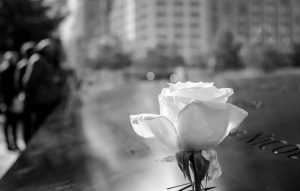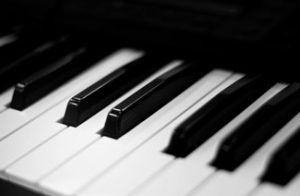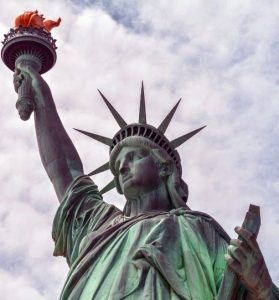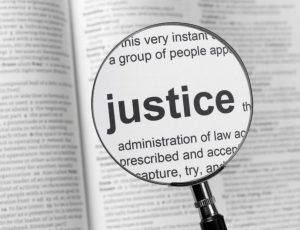Remembering 9/11: Forgetting None
 As we remember the terrible devastation, sorrow and inhumanity those many years ago on 9/11, let’s also remember how people and institutions came together around the world to support one another on that day and since. Let’s remember also how our own Unitarian Universalist organizations, the UU Service Committee and UU Association, together raised funds from members/congregants across the country to support the families and loved ones of 9/11 victims who would not receive support from “traditional” charities.
As we remember the terrible devastation, sorrow and inhumanity those many years ago on 9/11, let’s also remember how people and institutions came together around the world to support one another on that day and since. Let’s remember also how our own Unitarian Universalist organizations, the UU Service Committee and UU Association, together raised funds from members/congregants across the country to support the families and loved ones of 9/11 victims who would not receive support from “traditional” charities.
Undocumented workers’ families were ineligible for support from the government and many charities – even when the victims were the sole support of the family. Because of their status, undocumented workers had toiled in the shadows of the Twin Towers in obscurity, and families had no proof that the worker had held a job. Additionally, the families lacked the class advantage that could open doors to their new country’s legal system.
In 2001, legal marriage was not yet available for lgbtq+ individuals. Without a marriage license, the partners of 9/11 victims and their children were often ineligible for support from most organizations. The UU Service Committee worked with immigrant rights and lgbtq+ groups on the ground in New York City, Washington, D.C. and Pennsylvania to make sure that classism and other forms of bias could not keep families from receiving the help and support they needed.
Additionally, UUSC continued to support those affected by the tragedy. For example, it funded clinics addressing the rise in respiratory illnesses in communities of color that were in the direct path of the massive dust clouds that filled the air following the towers’ collapse. And, of course, individual UU congregations and groups were on the front lines to support 9/11 survivors and families in the immediate aftermath and beyond.
So, as we remember the events of 9/11, let us remember also to continue the fight against classism and bias. And, as UUs, let us continue to press for lgbtq+, BIPOC and immigrant rights – all under attack from organized internal forces. Remember everyone!
Homeless at the Piano
Andy Pope, a musical prodigy with amazing creativity and passion for the performing arts has been a performer and composer since he was a child. A costly medical misdiagnosis led to a health crisis resulting in a decade of homelessness. He shares an account of his undeterred pursuit of that passion that created Eden in Babylon currently under development at the Regional Theater of the Palouse slated for production in summer 2023.
 When I was homeless, I would wake up on a couple of pieces of cardboard, sometimes set over dirt. Sometimes I slept on a ramp on the side of a Catholic church. I would wake when the sky was getting light, then wander into a nearby AA fellowship. There I would hit the bathroom for a quick clean-up before grabbing a cup of coffee.
When I was homeless, I would wake up on a couple of pieces of cardboard, sometimes set over dirt. Sometimes I slept on a ramp on the side of a Catholic church. I would wake when the sky was getting light, then wander into a nearby AA fellowship. There I would hit the bathroom for a quick clean-up before grabbing a cup of coffee.
Make that three cups. The coffeemaker there was a homeless lady with 30+ years of sobriety in Alcoholics Anonymous. I remember her commenting how I would sit at the meeting and appear to be calmer and calmer, the more coffee I drank.
There was a none-too-pretty picture of the self-serving homeless person, who would come into the Berkeley Fellowship, grab a cup of coffee intended for an AA member, and then leave the premises. I did not want to conform to that picture.
So I sat for an hour, listened and occasionally spoke. I heard many wise sayings in that room, from people who had effectively found recovery from alcoholism and drug abuse. Inwardly, however, I knew I was mostly in it for the coffee.
There were also a few other ways for me to find a morning cup of coffee. Sometimes I would sleep in an illegal spot on campus near a Starbucks. I’d have saved a buck and change from the previous night, and then I would get to sit in the Starbucks with a newspaper—almost looking like a “normal” person.
The Men’s Shelter had excellent Peet’s coffee along with oatmeal, eggs, bread, peanut butter and all kinds of morning goodies. This was also an option. But my favorite coffee was the Kirkland Columbian they served at the North Berkeley Senior Center.
And it was only 40 cents.
Some mornings, I would get myself to the Senior Center as soon as it opened at eight. On other mornings, I was already coffee’d up from other sources. In that case, I would head straight to one of their pianos.
There were three pianos at the Senior Center. A nice Yamaha console upstairs, a Hamilton clunker in a corner room, and another decent Yamaha in the main auditorium. There, coffee was available, and lunch would be served for three bucks—or free if you were strapped.
But I didn’t want to play in the auditorium. There were too many people there, and I did not want to disturb them. Often, when I tried to play the piano somewhere—at a church for example—I was told to stop using their piano due to “insurance issues.” I guess the days of playing in U.C. dorms and practice rooms were gone, and I was generally pretty piano-starved throughout my homeless sojourn.
As for the piano upstairs, there was too much interference in the environment. Yoga classes going on, people on exercise bikes, cramped quarters. So I gravitated toward the piano in the corner of the building, which happened to be situated right next to the pool room.
Though it wasn’t the best piano, I certainly got the best reaction I could have hoped for at the time. Usually, there were about ten homeless guys shooting pool in the room next door. I could hear them cheering, sometimes after every tune. Sometimes they all appeared outside the door—smiling and clapping, and asking for more. Once one of the guys came into the room and started snapping his fingers beside me, groovin’ on the sounds. (I remember it was during the song “Skylark” by Hoagy Carmichael.)
So I was getting the best of both worlds—a bit of practice and a bit of positive attention. A far cry from the mostly negative attention I was receiving from elsewhere.
But one day, as I approached the room with the piano, I saw a sign on the pool hall:
Closed for Repairs
Disturbed, I approached the lady at the front desk to complain.
“Why’d you close down the pool hall?” I asked Laurie. “Those guys were my only audience!”
“Nothing personal,” she began, “but your friends were getting drunk at eight in the morning, and kinda wreaking damage to the building. We had to kick them out to fix up the place. They can’t be drinking like that on our property.”
“Well,” I retorted, “I didn’t even notice they were drunk! I just thought they were an unusually appreciative audience.”
At that, Laurie didn’t miss a beat.
“Well play out here then!” she suggested, pointing to the main auditorium.
“But if I do that,” I replied, “all you guys will be able to hear me.”
“We WANT to hear you!!” she shouted, as though trying to jolt me out of a delusion.
“Oh,” I said, sorta shuffling in my shoes. “Well, in that case, I guess you can be my audience.”
The sense of identity crisis that went through my head at that moment was quite profound. Why on earth would I only want to play the piano for other homeless people?
I think it was this. I had gotten so used to only being accepted by people who were outside, and being looked down upon by people who lived inside, I couldn’t imagine them doing anything other than to look down on me, even as I played the piano.
After all, my piano playing is not appreciated by all people at all times. Many people like it, but others don’t. Inside me, however, it was seen as something that gave me a sense of value. It separated me from the picture of the burned-out homeless person, having lost all incentive, having lost all hope.
I did not want to hear the cries of derision and mockery from people who lived indoors. I heard them too often on the streets, and I had not permitted them to touch my musicianship.
Until Now
For now, I started playing every morning in the main auditorium and was actually very surprised at the reception. Even a fellow from the Catholic church on whose ramp I slept stopped by, quizzically enjoying the music. I occasionally received tips from homeless people who hung out all day in the computer room.
It wasn’t long before I was doing a full-on concert at the North Berkeley Senior Center. People filmed me on their smartphones, using those big tripods. I still have footage from the concert, to this day.
I remember it was a momentous occasion. I even delayed an opportunity to rent a room on the Russian River from a Facebook friend-of-a-friend. I remember Jonathan, one of the men who helped run the Senior Center, trying to persuade me to take the room instead. He thought I should have jumped at the chance to grab a rental far away from the scene of my chronic homelessness, on the beautiful Russian River.
“No way!” I told him. “That room can wait!”
Needless to say, I lost the opportunity to get the room due to my unusual set of priorities. I did however show up for the show—in as fine a form as ever. How I enjoyed the discussion, the smiles—all the applause from people in my age group, people who appreciated music just like me, and who just happened to live indoors.
After the last song, which I believe was “Bridge Over Troubled Water,” I was so happy I crossed over to the other side of the auditorium to grab another cup of coffee.
There, I was denied my coffee—for I did not have 40 cents.
Homeless at the Piano
© 2022 Andy Pope
Special Youth Blog
ICE, Refugees and Justice
Give me your tired, your poor, your huddled masses yearning to breathe free, The wretched refuse of your teeming shore. Send these, the homeless, tempest-tossed to me, I lift my lamp beside the golden door!
Emma Lazurus, 1883
 A refugee by definition is a person who has been forced to leave their country in order to escape war, persecution or natural disaster. These are typically people with no homes, no money, no tangible evidence of their past life, because they had to move often without any advanced warning for their survival. These are people who despite their former social class advantage are left with very little.
A refugee by definition is a person who has been forced to leave their country in order to escape war, persecution or natural disaster. These are typically people with no homes, no money, no tangible evidence of their past life, because they had to move often without any advanced warning for their survival. These are people who despite their former social class advantage are left with very little.
There are 26.4 million of these people in the world right now. According to Amnesty International, all refugees have the right to receive assistance, the right to protection from abuse and the freedom to seek asylum, regardless of who they are or where they come from. What does the United States have in order to help refugees? Well, one of the most notable and feared agencies is the U.S. Immigration and Customs Enforcement, famously known as ICE. ICE has one thing they are especially good at doing; sending many refugees back home. These refugees get sent back because they don’t have proper documentation, money or identification. Things I would assume that a refugee would have trouble attaining just based on the definition of a refugee.
We have to protect the values of our United States, the values our founding fathers used to create the constitution. The values that throughout United States history were exemplified by hope, refuge and new beginnings. For we are truly the land of second chances. The Statue of Liberty offers a beacon of hope to those around the world that the United States is the home of freedom and liberty. ICE contradicts these values. ICE. isn’t patriotic. The agency seems to be interested in preventing some people from getting to experience these patriotic values.
I have a question for each of you. Are your family members or ancestors immigrants? If so, they likely moved to the United States for freedom and hope or whatever reason that was important to them. Aren’t you glad that they did that so you can have the life you have? Aren’t you glad that the family your ancestors started is here? Aren’t you proud of your heritage, whatever it may be? So why do we want to restrict other people from doing the same? Do we not want to give them the chance to build a family and a life, just like yours did?
This past summer Afghanistan fell to the Taliban. Now, there are more than five million Afghan refugees, many of which are trying to flee to the United States for safety. The U.S. response has been to send most of these refugees to holding centers or other places outside of the United States. They denied these people safety. Will they do the same to Ukrainians fleeing the war?
I work in a restaurant and many of the Immigrants I work with are afraid. One of my friends is constantly afraid of getting deported to Mexico, even though he is legally here and not even from Mexico. My friend works every day to support his family. He is 17 and goes to high school and has two jobs. He is the father figure to his younger brothers and he supports his mom financially. Why would ICE deport him, an honest kid just trying to give a better life to his mother and brothers? Why does he live in fear when he has not done anything wrong?
When I read about these people, they aren’t just statistics but mothers, fathers and my friends who are scared, scared for their future and their children’s future. They are not wealthy or influential, but they work hard and are decent and honest people just trying to live.
“Refugee Admissions – United States Department of State.” U.S. Department of State, U.S. Department of State, 8 Oct. 2021, www.state.gov/refugee-admissions/.
It’s Hard Right Now, but Keep Moving Forward
 Denise Moorehead, UU Class Conversations
Denise Moorehead, UU Class Conversations
I sat in a staff meeting on Wednesday morning, May 25, 2022, listening to my colleagues share their reactions to a gunman’s rampage that killed 19 children and two teachers in Uvalde, Texas, the day before. We are administrators for private schools serving students from 2 to 20 years old. The head of our team said his first response was to scream, “NO MORE.” Another — the most buttoned-down one among us — said she was so #!!*ing tired of the carnage followed by nothing from those at the highest levels elected to make change.
When we talked about the steps we’d taken/needed to take to support our students and parents, the remarks by one school director broke my heart. She said with a deep sigh, “We sent an email to parents last night. We updated a message that was first written to families 10 years ago after the Newtown, Conn., massacre.” She added that she had updated that letter countless times for the many mass shootings since Newtown as well as for state-instituted killings like that of George Floyd.
In the past decade, our schools have made a substantial investment in improving security and in preparing students and staff to react quickly in cases of a dangerous intruder. So, why are we stuck in the same place 10 years after Newtown? As one politically-active colleague said of her own social justice efforts, “Why even bother anymore?”
Why? Because we must.
But It’s Hard
I have been involved in social justice work since I was a child. My mom took me to community-building activities while I was still in grade school. These are hard times for people who believe in social justice, equity, and addressing classism and racism.
The expected overturning of Roe v. Wade will most severely impact women and families with less class advantage. According to a May 2022 NPR report on the landmark Turnaway Study, women denied an abortion were four times more likely to be living in poverty years later than those who had one. Their children were less likely to attain higher education were more likely to be involved in crime and had lower adult earnings.
According to a recent study by Columbia University researchers, more than 3.7 million children in the U.S. slipped into poverty when conservative members of Congress refused to extend the expanded Child Tax Credit beyond December 2021. States across the nation have outlawed telling the truth about racism and the racial wealth gap, allowing transgender children to become themselves or even providing water to people waiting in line to vote (in under-resourced primarily black and brown areas). The proliferation of new voter suppression laws is meant to keep people of color and those with less class advantage from participating in American democracy. And this is the tip of the iceberg when we look at the backpedaling of policies that have advanced social justice, equity and equality.
The effects of these policy reversals have not and will not directly touch the lives of people in the sphere of our elected officials. Over half of the members of Congress are well-educated millionaires from safe neighborhoods with “good schools.” According to FundHero December 2020 research, even in local elections the average cost for each vote received is $1.00. I don’t know about you, but I don’t have $5,000 to be elected to the local Library Board.
It’s no surprise then, that most federal and local policies support those with more class advantage. This is true of gun laws also. According to Mark S. Kaplan, professor of Social Welfare at UCLA, there is a strong relationship between poverty, inequality and firearm violence*.
It’s Up to Us
It is hard to keep up the fight for justice right now, whether it is for social class, race, gender, LQBTQ+, disability rights and/or other forms of equity. But oppression can only fester and grow when people give up hope for a future that holds promise for each person. We can pause for a few moments to feel sad, overwhelmed and discouraged. We are human. But then we have to take a breath, regroup and keep pushing forward.
Here are just some of the lesser-known social justice pioneers I appreciate:
- Frances Perkins, the first woman to serve as a member of a U.S. president’s Cabinet and a champion of those with less class advantage.
- South African students who mobilized and led the 2015-17 #RhodesMustFall and #FeesMustFall movements that fundamentally changed the landscape of higher education in South Africa.
- U.S. racial justice heroes like John Lewis, A. Philip Randolph, Bayard Rustin, Ella Baker, Callie House and Fred Korematsu, Lupe Anguiano and Chrystos (Menominee)
- Frank Bowe who worked to help people with disabilities
- Modern-day and historical women’s rights activists like Panusaya Sithijirawattanakul and Emmeline Pankhurst
- Environmentalists like Nnimmo Bassey
Who are the modern-day and historical (s)heroes who inspire you to stay the course when you feel like giving up? Share yours in the comments below.


